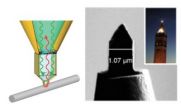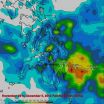(Press-News.org) SAN ANTONIO, TX (December 6, 2012)—Women are more likely to follow experts' advice on how to reduce their risk of an important side effect of breast cancer surgery—like lymphedema—if they feel confident in their abilities and know how to manage stress, according to new research from Fox Chase Cancer Center to be presented at the 2012 CTRC-AACR San Antonio Breast Cancer Symposium on Saturday, December 8, 2012.
These findings suggest that clinicians must do more than just inform women of the ways they should change their behavior, says Suzanne M. Miller, PhD, Professor and Director of the Psychosocial and Biobehavioral Medicine Program at Fox Chase and study author. Doctors and nurses should also provide strategies for women who feel less empowered to make those changes, and have fewer skills for reducing their stress.
"Women are in charge of their future, because there are things they can do to minimize the effects of treatment," says Miller. "If they get into a routine of doing them, it will reduce their stress and vulnerability."
The study, funded by the U.S. Department of Defense, focused on the side effect of surgery known as lymphedema—an incurable build up of fluid in the lymph nodes that can cause swelling and affect range of motion. In more severe cases, it can be quite painful. The rate of lymphedema can vary, but a significant proportion—perhaps as many as half—of women will develop it after undergoing surgery to remove breast cancer.
"Lymphedema affects everything you do, whether you're inside washing dishes, or outside trying to pick up a bag of groceries, your child, or your briefcase," says Miller. "It's a very salient condition."
There is no treatment for lymphedema, so the best thing women can do is try to reduce their risk of developing it in the first place, says Miller. Avoiding infections, burns, muscle strain, constrictions of their arms, and weight gain can help.
"That advice may sound easy to follow, but the reality is quite different," says Miller. To truly follow these recommendations, she says, women have to forever change and monitor their behavior—moisturize the arm on the side of surgery several times per day, use an electric shaver instead of a razor, wear gloves when doing housework or physical activity, avoid tight jewelry or clothes, stop carrying heavy objects, and constantly protect the arm from being jostled or squeezed, for instance. "These changes are going to be very intrusive into a woman's everyday life," says Miller.
Part of the struggle for women is that changing their behavior serves as a daily reminder of their breast cancer, she notes. "Taking precautions requires attending to the fact they had cancer, which makes many women depressed and anxious."
To investigate what helps women make such dramatic behavioral changes, Miller and her colleagues met with 103 women immediately after breast cancer surgery to discuss lymphedema and their attitudes about it, and provided materials from the American Cancer Society on how to reduce their risk. They then checked in with women later to see how well they had adhered to the advice.
Six months later, only 50% of women appeared to be diligently following the recommendations. Daily behavioral changes—such as wearing gloves when doing household chores, or using an electric shaver—were the hardest to maintain.
One important factor in the rate of adherence was women's attitude—specifically, women were most likely to take steps to reduce their risk of lymphedema if they felt confident they could physically follow the recommendations, believed these behaviors would control their risk, and had strategies to cope with stress. For instance, says Miller, a woman needed to feel confident she wouldn't forget to put on gloves every time she did housework, and could calm herself down if these permanent changes in behavior created anxiety about being a cancer survivor.
These findings suggest clinicians should provide additional tools to help women adhere to expert advice, suggests Miller, including finding ways to track what they do and reward themselves, seeking out stories of women who are coping with the same challenges, joining support groups, and learning relaxation techniques.
Clinicians also need to talk to families, so everyone is on board with a woman's "new normal,'" says Miller. "Managing a woman's risk of lymphedema requires a shift in the dynamics of her relationships, so the people around her can pitch in and take over some of the tasks she should no longer do."
Reducing the risk of lymphedema involves women taking control of the next phase of their lives, says Miller. "Being a survivor is wonderful, It's great to get to that stage. Managing lymphedema should be seen as managing anything else in life that keeps you healthy, such as weight, or exercise. Lymphedema is something that can generally be helped by simple behaviors."
###
Co-authors on this study include Kerry Sherman, PhD, from Fox Chase, and Pagona Roussi, PhD, from Aristotle University of Thessaloniki, Greece.
Fox Chase Cancer Center, part of the Temple University Health System, is one of the leading cancer research and treatment centers in the United States. Founded in 1904 in Philadelphia as one of the nation's first cancer hospitals, Fox Chase was also among the first institutions to be designated a National Cancer Institute Comprehensive Cancer Center in 1974. Fox Chase researchers have won the highest awards in their fields, including two Nobel Prizes. Fox Chase physicians are also routinely recognized in national rankings, and the Center's nursing program has received the Magnet status for excellence three consecutive times. Today, Fox Chase conducts a broad array of nationally competitive basic, translational, and clinical research, with special programs in cancer prevention, detection, survivorship, and community outreach. For more information, visit Fox Chase's Web site at www.foxchase.org or call 1-888-FOX CHASE or (1-888-369-2427). END
Attitudes predict ability to follow post-treatment advice
Study from Fox Chase Cancer Center finds women are more likely to modify their behavior to avoid a post-surgery complication if they feel empowered and can manage stress
2012-12-07
ELSE PRESS RELEASES FROM THIS DATE:
Seeing in color at the nanoscale
2012-12-07
If nanoscience were television, we'd be in the 1950s. Although scientists can make and manipulate nanoscale objects with increasingly awesome control, they are limited to black-and-white imagery for examining those objects. Information about nanoscale chemistry and interactions with light—the atomic-microscopy equivalent to color—is tantalizingly out of reach to all but the most persistent researchers.
But that may all change with the introduction of a new microscopy tool from researchers at the Department of Energy (DOE)'s Lawrence Berkeley National Laboratory (Berkeley ...
Notre Dame research reveals migrating Great Lakes salmon carry contaminants upstream
2012-12-07
Be careful what you eat, says University of Notre Dame stream ecologist Gary Lamberti.
If you're catching and eating fish from a Lake Michigan tributary with a strong salmon run, the stream fish — brook trout, brown trout, panfish — may be contaminated by pollutants carried in by the salmon.
Research by Lamberti, professor and chair of biology, and his laboratory has revealed that salmon, as they travel upstream to spawn and die, carry industrial pollutants into Great Lakes streams and tributaries. The research was recently published in the journal Environmental Science ...
Silver nanocubes make super light absorbers
2012-12-07
DURHAM, N.C. -- Microscopic metallic cubes could unleash the enormous potential of metamaterials to absorb light, leading to more efficient and cost-effective large-area absorbers for sensors or solar cells, Duke University researchers have found.
Metamaterials are man-made materials that have properties often absent in natural materials. They are constructed to provide exquisite control over the properties of waves, such as light. Creating these materials for visible light is still a technological challenge that has traditionally been achieved by lithography, in which ...
NASA compiles Typhoon Bopha's Philippines Rainfall totals from space
2012-12-07
NASA's Tropical Rainfall Measuring Mission, or TRMM satellite can estimate rainfall rates from its orbit in space, and its data is also used to compile estimated rainfall totals. NASA just released an image showing those rainfall totals over the Philippines, where severe flooding killed several hundred people. Bopha is now a tropical storm in the South China Sea.
High winds, flooding and landslides from heavy rains with Typhoon Bopha have caused close to 300 deaths in the southern Philippines.
The TRMM satellite's primary mission is the measurement of rainfall in the ...
UC Davis study shows that treadmill testing can predict heart disease in women
2012-12-07
(SACRAMENTO, Calif.) — Although there is a widespread belief among physicians that the exercise treadmill test (ETT) is not reliable in evaluating the heart health of women, UC Davis researchers have found that the test can accurately predict coronary artery disease in women over the age of 65. They also found that two specific electrocardiogram (EKG) indicators of heart stress during an ETT further enhanced its predictive power.
Published in the December issue of The American Journal of Cardiology, the study can help guide cardiologists in making the treadmill test ...
TGen-US Oncology data guides treatment of metastatic triple-negative breast cancer patients
2012-12-07
PHOENIX, Ariz. — Dec. 6, 2012 — Genomic sequencing has revealed therapeutic drug targets for difficult-to-treat, metastatic triple-negative breast cancer (TNBC), according to an unprecedented study by the Translational Genomic Research Institute (TGen) and US Oncology Research.
The study is published by the journal Molecular Cancer Therapeutics and is currently available online.
By sequencing, or spelling out, the billions of letters contained in the genomes of 14 tumors from ethnically diverse metastatic TNBC patients, TGen and US Oncology Research investigators found ...
General thoracic surgeons emerge as leading providers of complex, noncardiac thoracic surgery
2012-12-07
While thoracic surgeons are traditionally known as the experts who perform heart surgeries, a UC Davis study has found that general thoracic surgeons, especially those at academic health centers, perform the vast majority of complex noncardiac operations, including surgeries of the esophagus and lungs.
The authors said their results, published in the October issue of The Annals of Thoracic Surgery, support the designation of general thoracic surgery as a distinct specialty, which will benefit patients when selecting surgeons for specific procedures.
"In years past, ...
Apollo's lunar dust data being restored
2012-12-07
Forty years after the last Apollo spacecraft launched, the science from those missions continues to shape our view of the moon. In one of the latest developments, readings from the Apollo 14 and 15 dust detectors have been restored by scientists with the National Space Science Data Center (NSSDC) at NASA's Goddard Space Flight Center in Greenbelt, Md.
"This is the first look at the fully calibrated, digital dust data from the Apollo 14 and 15 missions," said David Williams, a Goddard scientist and data specialist at NSSDC, NASA's permanent archive for space science mission ...
December 2012 Story Tips
2012-12-07
DISASTER RESPONSE – Limiting access . . .
Ensuring that only people who have legitimate business are allowed to enter areas hit by floods, hurricanes or other disasters is a big challenge, but Credentialing 2.0 offers a software solution. "Obviously, first responders, utility crews, tree cutters, disaster relief workers and members of the media have reasons to be on the scene, but there's no efficient way to control access," said Oak Ridge National Laboratory's David Resseguie, who leads the Credentialing 2.0 development team. The ORNL system helps officials to control ...
Combining two genome analysis approaches supports immune system contribution to autism
2012-12-07
Researchers using novel approaches and methodologies of identifying genes that contribute to the development of autism have found evidence that disturbances in several immune-system-related pathways contribute to development of autism spectrum disorders. The report published December 4 in the open-access journal PLOS ONE powerfully supports a role for the immune function in autism by integrating analysis of autism-associated DNA sequence variations with that of markers identified in studies of families affected by autism.
"Others have talked about immune function contributions ...
LAST 30 PRESS RELEASES:
Bureaucracy Index 2026: Business sector hit hardest
ECMWF’s portable global forecasting model OpenIFS now available for all
Yale study challenges notion that aging means decline, finds many older adults improve over time
Korean researchers enable early detection of brain disorders with a single drop of saliva!
Swipe right, but safer
Duke-NUS scientists identify more effective way to detect poultry viruses in live markets
Low-intensity treadmill exercise preconditioning mitigates post-stroke injury in mouse models
How moss helped solve a grave-robbing mystery
How much sleep do teens get? Six-seven hours.
Patients regain weight rapidly after stopping weight loss drugs – but still keep off a quarter of weight lost
GLP-1 diabetes drugs linked to reduced risk of addiction and substance-related death
Councils face industry legal threats for campaigns warning against wood burning stoves
GLP-1 medications get at the heart of addiction: study
Global trauma study highlights shared learning as interest in whole blood resurges
Almost a third of Gen Z men agree a wife should obey her husband
Trapping light on thermal photodetectors shatters speed records
New review highlights the future of tubular solid oxide fuel cells for clean energy systems
Pig farm ammonia pollution may indirectly accelerate climate warming, new study finds
Modified biochar helps compost retain nitrogen and build richer soil organic matter
First gene regulation clinical trials for epilepsy show promising results
Life-changing drug identified for children with rare epilepsy
Husker researchers collaborate to explore fear of spiders
Mayo Clinic researchers discover hidden brain map that may improve epilepsy care
NYCST announces Round 2 Awards for space technology projects
How the Dobbs decision and abortion restrictions changed where medical students apply to residency programs
Microwave frying can help lower oil content for healthier French fries
In MS, wearable sensors may help identify people at risk of worsening disability
Study: Football associated with nearly one in five brain injuries in youth sports
Machine-learning immune-system analysis study may hold clues to personalized medicine
A promising potential therapeutic strategy for Rett syndrome
[Press-News.org] Attitudes predict ability to follow post-treatment adviceStudy from Fox Chase Cancer Center finds women are more likely to modify their behavior to avoid a post-surgery complication if they feel empowered and can manage stress



